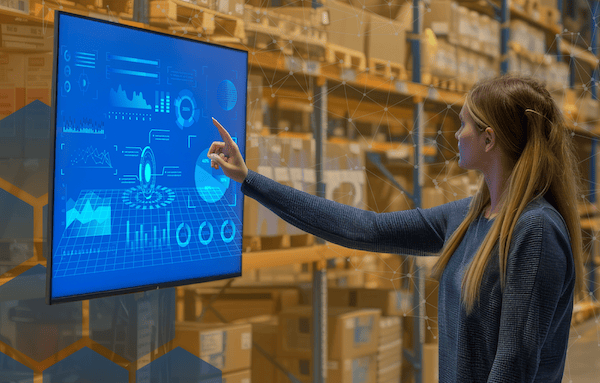- Warehouse Wisdom. Weekly.
- Posts
- Warehouse Wisdom. Weekly. 03/14/2025
Warehouse Wisdom. Weekly. 03/14/2025
Only the most relevant news for SMBs to improve logistics – picked, packed, and delivered without the bias.

Happy Friday!
AI and eggs continue to be key indicators in the logistics world. AI might be coming for our jobs, but at least it’s not coming for our shopping carts—yet. A solid 66% of U.S. consumers still prefer to make their own purchases rather than let artificial intelligence handle their purchases. But that also means 34% of people are perfectly fine with a bot choosing that next outfit. And consumers have drawn the line at giving up eggs, no matter how high the price climbs. The Justice Department, however, is conducting an investigation to see if large egg producers are colluding to raise prices. On the bright side, the USDA is suggesting that egg prices might finally be on their way down as the bird flu outbreak slows. So, maybe we won’t have to take out a second mortgage for breakfast after all..
This week, we’re also covering the latest in logistics and warehousing, including the mysterious disappearance of more retail stores, falling container rates, UPS’s latest round of surcharges, and the EPA deciding to ease up on emission rules. Let’s dive in.
Freight and Shipping
More surcharges, USPS DOGE aid, and privatization talk

Just when shippers thought they could catch a break, UPS has decided it’s time for more fuel surcharge hikes. And if history is any guide, FedEx will likely follow suit with its own price adjustments soon.
In an unexpected move, USPS is teaming up with DOGE—not the meme coin, but the Department of Government Efficiency. This collaboration is designed to improve efficiency and cut costs, which USPS could certainly use. If successful, this might be the first time in history that the words “USPS” and “optimized” are used in the same sentence without sarcasm.
While the big carriers keep adjusting fees and tinkering with operations, alternative delivery providers are quietly expanding their footprint. Companies like Veho, SpeedX, and Jitsu are ramping up coverage, giving businesses more options beyond the traditional players. As these upstarts continue to grow, they might just force UPS, FedEx, and USPS to rethink how they do business—or at least reconsider their obsession with new surcharges.
And lastly on the USPS front, the debate over privatization is heating up again. With discussions resurfacing about whether turning the Postal Service into a private entity would fix its financial woes, the potential impacts could be huge. Some see privatization as a path to better service and efficiency, while others worry it could mean even higher costs and less accessibility.
Global Logistics
Ship collisions, falling rates, and Red Sea trouble

The North Sea provided a real-life lesson in why visibility is kind of important in maritime navigation. New footage shows the critical moments before a ship collision in dense fog, proving that yes, massive vessels and zero visibility make for a bad combination. At the time of our reporting, unfortunately one crew member was still missing.
On the freight front, ocean container rates have plunged 40%, offering some much-needed relief for shippers. But before anyone gets too excited, this drop comes as new U.S. tariff plans loom overhead, leaving logistics teams wondering if they should be celebrating or bracing for impact.
And because the shipping world can never have too much peace of mind, the Houthis have issued new threats in the Red Sea. This is an escalation from the March 7th demand and something to keep a close eye on.
Meanwhile, the proposed U.S. tariffs on Chinese ship calls could throw another wrench into the system, this time potentially squeezing intermodal networks even further.
Logistics Vitals
Temu undercuts Amazon with more idential products

Amazon might want to check its homework because many of its products have identical matches on Temu—a platform best known for rock-bottom prices and aggressive marketing. While Amazon has long been the dominant e-commerce giant, Temu seems to be proving that if you can’t beat them, just sell the exact same thing for less. Key Data Points:
10% of Amazon’s products have an exact match on Temu.
77% of products listed on Amazon have a close match on Temu.
For close matches, Temu sellers are listing for as much ast 40% less.
Logistics Sustainability and Jobs
Regulation rollback and jobs hold steady

The EPA has decided to hit the brakes on stricter emissions rules, rolling back regulations that were set to tighten standards for trucks and other heavy-duty vehicles. Depending on who you ask, this is either a much-needed win for an industry already drowning in compliance costs—or a step backward for environmental progress. Either way, it means fleets will have a little more breathing room (pun fully intended) before being forced to invest in expensive new technology.
Meanwhile, logistics employment took a slight dip in February, but it’s still outpacing overall U.S. job growth. In an industry that’s been a rollercoaster of hiring booms and slowdowns, this suggests that while things may be cooling off a bit, the sector remains relatively strong. Someone still has to move all those e-commerce orders, even if the robots are slowly trying to take over.
Marketplaces
Store closures, AI takeovers, and eBay’s secondhand success

The retail apocalypse continues, and this time, it’s coming for another 15,000 stores—at least, according to some projections. Brick-and-mortar locations just can’t catch a break, and at this rate, mall walkers might have to start doing laps in parking lots. Between rising costs, shifting consumer habits, and the never-ending dominance of e-commerce, physical stores are dropping like flies. But don’t worry—there’s always a Spirit Halloween ready to swoop in and take over the empty space.
Meanwhile, Alibaba’s AI-powered search engine has already racked up over 1 million users, proving that AI isn’t just for writing term papers and generating questionable deepfakes. If this trend continues, soon you might not even have to type what you’re looking for.
Speaking of e-commerce, eBay is thriving—its revenues are up, and it’s doubling down on AI features. While it may not have the flashiness of Amazon or the mystique of Alibaba, eBay continues to prove that secondhand treasures (and questionable impulse buys) are still big business. With AI playing a bigger role, expect more personalized recommendations and streamlined searches.
Warehouse Quick Deliveries
Kroger goes digital, Walgreens gets bought, and Target arms its supply chain
“Because UPS announced these changes first, it gives FedEx the political cover they need to be able to match it while citing UPS as the impetus for the change.”